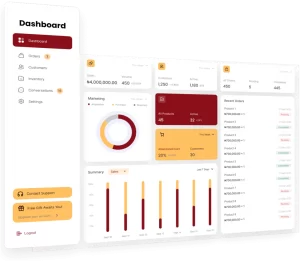In today’s business environment, where transparency and accountability are more crucial than ever, the concept of an “audit trail” has become a foundational tool for companies. An audit trail is a systematic record that tracks the details of financial transactions, data modifications, or other significant activities within a business system.
By maintaining a chronological record, companies can verify the authenticity and accuracy of their data, making audit trails invaluable for compliance, fraud prevention, and data security. Essentially, an audit trail provides businesses with a clear, accessible history of events that can be reviewed and analyzed as necessary.
Sa artikulong ito, tatalakayin natin kung paano gumagana ang mga audit trail, bakit sila mahalaga sa mga operasyon ng negosyo, at ang iba’t ibang paraan kung paano nila mapapabuti ang mga proseso sa pagitan ng mga negosyo.
Table of Contents

Key Takeaways
|
What is an Audit Trail?
An audit trail is a chronological record of actions or changes made within a system, capturing essential details such as who performed an action, what was changed, and when it occurred.
Audit trails are crucial in industries like finance and healthcare, enhancing accountability and transparency by allowing businesses to track activity, prevent fraud, and comply with regulatory requirements such as GDPR, HIPAA, and SOX.
Furthermore, in qualitative research, an audit trail is invaluable for documenting the research process, ensuring that methods are transparent and can be replicated by others, thereby bolstering the credibility of the findings.
With an effective audit trail, companies can build trust with clients, regulators, and partners by demonstrating secure and transparent operations. This precise recordkeeping supports compliance, facilitates troubleshooting, and helps businesses make informed decisions based on accurate historical data.
What are Audit Trails Used For?
Audit trails are vital tools for monitoring and documenting all actions taken within a company’s systems. By capturing the details of every transaction, update, and access point, they provide a clear and comprehensive record of activities. This transparency is essential for maintaining control over business processes and ensuring smooth operations.
In the context of ERP systems, audit trails play a significant role in preventing fraud and identifying irregularities. By maintaining detailed log businesses can quickly detect discrepancies and address issues before they escalate.
This proactive approach protects data integrity and helps organizations comply with relevant regulations and standards. Moreover, audit trails enhance trust and accountability among stakeholders. They simplify reporting processes and facilitate accurate data analysis, enabling better decision-making.
By implementing robust audit trails, companies in the Philippines can strengthen their operational security and establish a reputation for reliability and transparency.
Understanding the Purpose of an Audit Trail
Maintaining a comprehensive audit trail is essential to ensure business processes remain secure, efficient, and compliant. Here are the main purposes of an audit trail and how each supports a business’s operational goals:
- Enhancing accountability and transparency: An audit trail provides a detailed record of each user’s actions within a system, including any edits, deletions, or updates made to data. This transparency holds team members accountable for their activities and helps identify any discrepancies or errors that may arise.
- Detecting and preventing fraud: An audit trail can help companies spot unusual or unauthorized activity that might indicate fraud by tracking actions in real time. This level of tracking is especially important for reducing internal fraud, as it allows management to see who accessed specific data and what actions were taken.
- Strengthening data security: Audit trails are vital for tracking access to sensitive information and detecting potential cyber threats. In case of a breach, they offer a record to pinpoint its source and scope, helping prevent future incidents.
- Supporting compliance requirements: Many industries require audit trails to ensure data integrity and transparency. For example, companies under the Sarbanes-Oxley Act must keep audit trails for external review, ensuring all compliance measures are documented and verifiable.
Types of Audit Trails
Understanding the different types of audit trails helps businesses choose the most effective method for monitoring and securing their data. Here are the main types of audit trails and what each is designed to accomplish:
- User activity audit trails: This type tracks the actions of individual users within a system, such as logins, file access, changes, and deletions. User activity audit trails help businesses monitor user behavior, ensuring accountability and detecting unauthorized access or unusual actions.
- System-level audit trails: System-level audit trails monitor the overall operations within a system, including system start-ups, shutdowns, crashes, and performance logs. These trails provide insights into the system’s health and can help identify technical issues, security vulnerabilities, or inefficiencies in system performance.
- Application audit trails: Application audit trails focus on activities within specific applications, such as CRM or ERP systems. These records track actions like data updates, transaction entries, and other interactions within the application. This helps ensure data integrity, improves application management, and can pinpoint where issues may arise in application workflows.
- Network audit trails: This type of audit trail captures data related to network activity, such as data transfers, remote access attempts, and internet usage. Network audit trails are essential for detecting cyber threats, monitoring for unauthorized access, and maintaining network security.
- Financial audit trails: These are designed to track financial transactions, from purchase orders to payment receipts. Each transaction is recorded with details like the parties involved, date, and amount, ensuring transparency in financial reporting and simplifying the auditing process.
Ang bawat uri ng audit trail ay nag-aalok ng natatanging mga benepisyo na nakakatulong sa isang ligtas at maayos na pinamamahalaang kapaligiran ng negosyo. Selecting the appropriate audit trails helps businesses monitor activity more effectively, protect sensitive data, and meet regulatory requirements.
The Business Advantages of Implementing Audit Trails
Audit trails are essential tools for accountants that help hold corporations accountable for their actions. Without audit trails to verify financial data, there would be little reason to trust the accuracy of a company’s financial reports. Thus, audit trails protect consumers from fraudulent reporting and contribute to the economy’s overall stability.
Furthermore, audit trails require organizations to maintain a comprehensive and up-to-date logging system, reducing the risk of fraud and other financial crimes. In sectors like healthcare, carefully maintained audit logs ensure that sensitive information, such as HIPAA-protected data, is only accessible to authorized individuals.
While audit trails provide crucial financial information necessary for the smooth operation of businesses, there are challenges associated with their maintenance and implementation.
The Business Disadvantages of Audit Trails
The primary challenge faced by corporations is the time and cost associated with maintaining a compliant audit log, particularly when the log is automated.
As the volume of logs grows, they can become difficult to manage and store. Additionally, if access to the logs is too broad, it may jeopardize the integrity of the data.
Moreover, in situations like banks assessing loan applications, the requirements for audit trails can sometimes be overly stringent. For instance, if a consumer fails to maintain adequate financial records, they may be unfairly denied loans that they would otherwise qualify for.
Simplify Audit Trail with HashMicro Software
Implementing HashMicro software can significantly simplify the management of audit trails for your business.
By integrating robust features into accounting system software, HashMicro ensures that every action is recorded accurately and securely, making it easier to maintain compliance and accountability.
This is crucial for businesses seeking the best accounting software solutions to enhance their financial operations. Here are some key features that contribute to simplifying audit trails with HashMicro:
- Financial dashboard: The financial dashboard provides a comprehensive view of key financial metrics and user interactions with financial data. It logs changes made to the dashboard settings and data inputs, allowing businesses to track how financial decisions are influenced by the displayed information.
- Fast bank reconciliation: This feature is crucial for maintaining accurate cash records. It automatically logs every transaction and adjustment made during the reconciliation process, creating a detailed audit trail that helps identify discrepancies between bank statements and internal records.
- Analytical reporting: Analytical reporting features record the creation, modifications, and data sources used in reports. This tracking forms an audit trail that provides transparency into how financial data is analyzed and interpreted, supporting accountability in financial reporting.
By leveraging these features, businesses can streamline their audit trail processes, ensuring compliance and enhancing overall operational efficiency with HashMicro software as part of their accounting system software solutions.

Conclusion
Audit trails play a crucial role in modern business operations by enhancing accountability, ensuring regulatory compliance, and safeguarding against fraudulent activities. Organizations can make informed decisions and improve overall operational integrity by maintaining a detailed record of all transactions and user interactions.
Implementing an effective audit trail system not only protects sensitive data but also fosters trust with clients and stakeholders. To experience the advantages of a robust audit trail, consider exploring HashMicro. Our software is designed to streamline financial management while ensuring compliance and security.
We invite you to take a free demo to see firsthand how HashMicro can optimize your business processes and improve your audit trail capabilities.
Frequently Asked Questions About Audit Trail
-
Why is an audit trail important?
It provides transparency, accountability, and helps detect errors or unauthorized activities within an organization.
-
How does an audit trail work?
It automatically logs each action taken in a system, including user details, time stamps, and the nature of the action.
-
Can an audit trail improve security?
Yes, it helps prevent fraud and unauthorized access by tracking user activities, making it easier to identify security breaches.
{
“@context”: “https://schema.org”,
“@type”: “FAQPage”,
“mainEntity”: [{
“@type”: “Question”,
“name”: “Why is an audit trail important?”,
“acceptedAnswer”: {
“@type”: “Answer”,
“text”: “It provides transparency, accountability, and helps detect errors or unauthorized activities within an organization.”
}
},{
“@type”: “Question”,
“name”: “How does an audit trail work?”,
“acceptedAnswer”: {
“@type”: “Answer”,
“text”: “It automatically logs each action taken in a system, including user details, time stamps, and the nature of the action.”
}
},{
“@type”: “Question”,
“name”: “Can an audit trail improve security?”,
“acceptedAnswer”: {
“@type”: “Answer”,
“text”: “Yes, it helps prevent fraud and unauthorized access by tracking user activities, making it easier to identify security breaches.”
}
}]
}












































